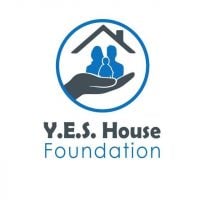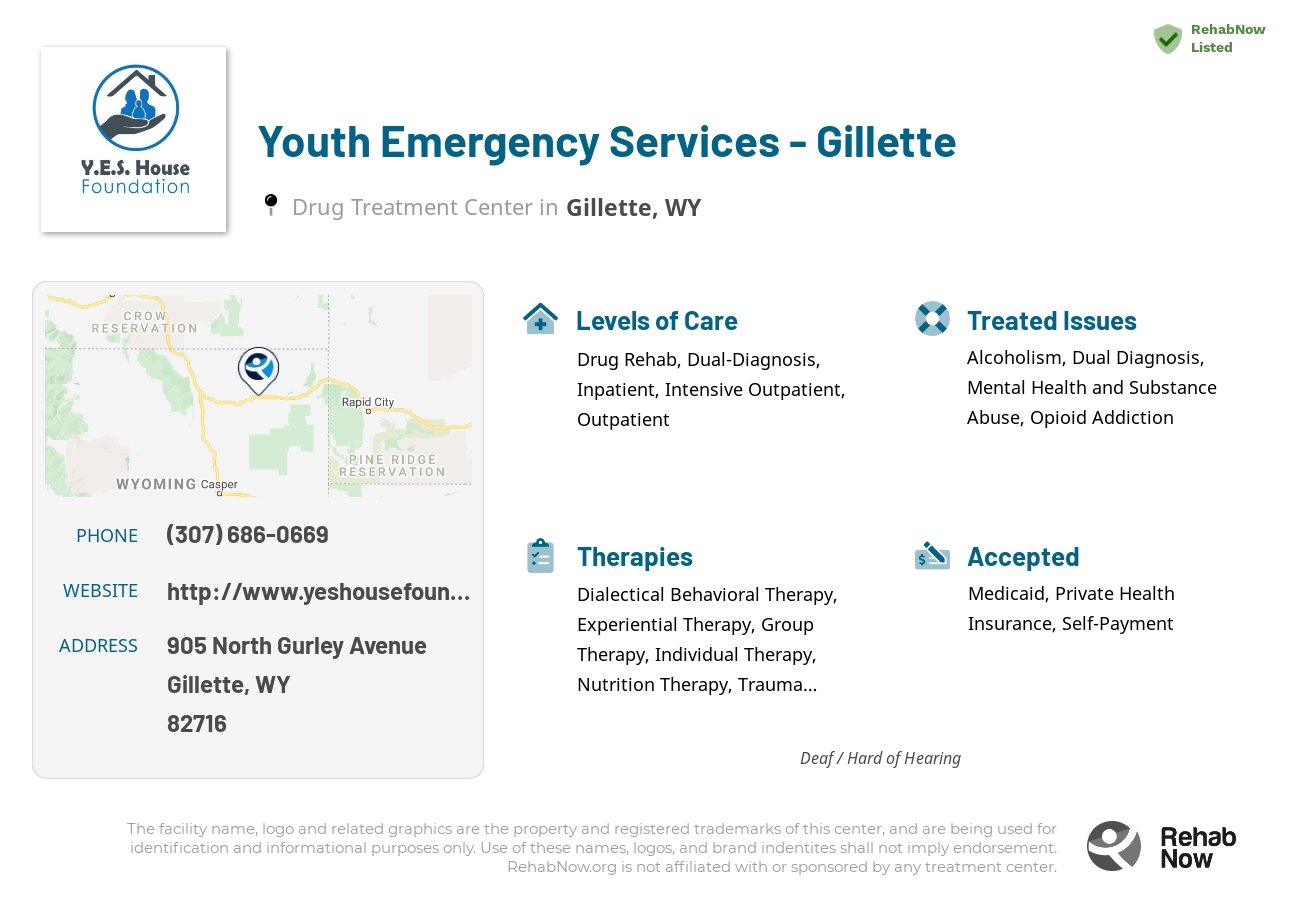Youth Emergency Services - Gillette
Drug Rehab Center in Gillette, Wyoming
Youth Emergency Services (YES) in Gillette, Wyoming provides comprehensive services to young people aged 10-24 with behavioral health needs, including mental health and substance misuse services, as well as community education and public awareness initiatives.
About Youth Emergency Services - Gillette in Wyoming
Youth Emergency Services - Gillette (YES) located in Gillette, Wyoming, provides comprehensive services to young people aged 10-24 with behavioral health needs, including mental health and substance misuse services. YES offers a wide range of evidence-based and trauma-informed interventions for young people in order to help them manage their mental health needs and use substances safely and responsibly. Services include individual, group and family counseling, medication management, crisis stabilization and residential services.
At YES, young people who are struggling with substance misuse can access a range of services provided by experienced professionals. Services include substance abuse assessments, motivational interviewing, cognitive behavioral therapy, relapse prevention, anger management and life skills training. Clients can also participate in supervised therapeutic activities and use the crisis stabilization center if needed. In addition, YES has formed a partnership with local drug courts to provide specialized services.
YES is both state and nationally accredited, licensed by the Wyoming Mental Health and Substance Abuse Professional Licensing Board, and has been recognized with the Quality Award from the Substance Abuse and Mental Health Services Administration (SAMHSA). YES also provides community education and public awareness initiatives and is involved in the Gillette community by providing participation in local coalitions and committees.
Genders
Ages
Modality
Additional
Conditions and Issues Treated
Many people who struggle with opioid addiction need to attend specific programs like methadone , Suboxone or Vivitrol clinics.
These types of programs will provide the patient with legal, prescription medications that can help them overcome their cravings for illegal opioids like heroin or fentanyl . If the patient has a chronic condition like Hepatitis C, they must undergo treatment before they can begin taking these medications.
Dual Diagnosis is a specific relationship between two or more disorders that have the same symptoms and can sometimes be treated together. This is used in the treatment planning process when dealing with drug addicts. Dual diagnosis can be viewed as a chronic medical condition that has comorbid psychiatric disorders.
Although addiction and a mental illness may have separate symptoms that are not easy to detect, they often go hand in hand. Many times, drug abuse is a direct result of the mental illness. In other words, treating the addiction will not resolve all of your issues. Unless you also treat the underlying mental illness, you will not be successful in achieving sobriety.
Levels of Care Offered
This center offers a variety of custom treatment tailored to individual recovery. Currently available are Drug Rehab, Dual-Diagnosis, Inpatient, Intensive Outpatient, Outpatient, with additional therapies available as listed below.
Inpatient treatment is an intensive program that takes place when a patient checks into a rehabilitation facility. The treatment includes detoxification and counseling sessions, which are round the clock. Outpatient treatments are also available, but inpatient care is advised as the first step of rehabilitation.
Intensive rehab ensures the patient stays in a substance-free atmosphere, improving treatment success rates. The patient participates in group therapy for motivation from other patients who have overcome addiction. Family members are also involved in providing emotional support throughout the program.
An intensive outpatient program is usually the first phase of addiction treatment. It provides relief for those who are addicted, but are not ready to commit to an inpatient setting. Typically, the patient lives at home and is able to work or go to school. IOPs consist of a daily 3 to 5-hour program, and there is a required number of hours per week. Most patients go to IOP between 20 and 40 hours per week. The patient attends group counseling and individual therapy throughout the duration of treatment. They also meet daily with their therapist to discuss how it’s going and where they are in the recovery process.
The goal here is to teach patients healthy coping skills, such as stress management and identifying thoughts and behaviors that lead to relapse. The implementation of these skills will be useful as the individual transitions into the next phases of treatment.
An outpatient treatment program is set up to help with alcohol or drug addiction, or a co-occurring disorder. The patient must attend the Wyoming facility for their therapy and other programs but are able to return home each night. The frequency of mandatory attendance decreases after much of Youth Emergency Services - Gillette‘s program is complete.
Therapies & Programs
Individual Therapy is a critical component of addiction recovery. Therapists work with patients to identify the root of their addiction and figure out how to better handle the issues that led to them using drugs. Individual Therapy is the one-on-one session where people meet with their therapist. Individual therapy provides a safe space for people to open up and discuss personal and sensitive topics which they may not feel comfortable discussing in a group setting.
Group Therapy is utilized by drug treatment centers like Youth Emergency Services - Gillette to provide the recovering drug addict with a platform to talk about their feelings and experiences. It also provides for an opportunity to learn from other addicts who have successfully overcome their addiction.
Group Therapy is employed in lectures, seminars, or discussion groups (the latter two are typically conducted as “therapy groups”). It is recommended that all group members be recovering addicts for this type of therapy to work (though it does not exclude others with lived experience).
Trauma therapy is a clinical process that helps individuals deal with mental stress often caused by traumatic events. It is generally done for children, teenage victims of sexual assault, and war veterans. The therapist helps the person identify, understand and work through the problem. This is done with the help of talking about it in group or one-on-one counseling sessions. Therapists use relaxation, role-playing, art, and music to help the person open up about what is bothering them.
Dialectical Behavior Therapy (DBT) is used by drug treatment centers across the United States to help drug addicts become sober. DBT combines traditional behavioral treatments with elements from DBT, including dialectics, distress tolerance, and interlocking issues. It is commonly used to treat Borderline Personality Disorder (BPD) along with substance abuse disorders. The four DBT modules are mindfulness, interpersonal effectiveness, emotion regulation, and distress tolerance.
Cognitive behavioral therapy is also a popular service for individuals living with addiction. This type of supportive treatment uses both one-on-one counseling and group sessions to teach addicts how to identify thoughts, behaviors and emotions that might increase their risk of relapse.
These professionals can help addicts develop coping skills for managing stress, improving self-esteem and overcoming triggers. They might also use behavioral therapy to help addicts learn how to avoid cravings and warning signs that could lead them back into addiction.
Therapy can be used as a step-down from inpatient treatment or as the primary method of overcoming an addiction. No matter which option is best for the addict, they will teach important emotional coping techniques, which can make it easier for addicts to get through the tough days.
Nutrition therapy has been used to help drug addicts for decades. Many early reports on addiction treatment indicate that some patients recovered from the “satisfying power of food”. For years, this phenomenon has been utilized as a treatment modality in eating disorders for adults, adolescents, and children. Specific nutrients have been identified that influence neurotransmitters associated with reward pathways of the brain.
Studies have shown that carbohydrate loading with complex carbohydrates to elevate serotonin levels was effective in treating bulimia nervosa. This approach prompted researchers to explore the use of this type of nutritional intervention in other disorders.
Nicotine replacement therapy treats nicotine addiction using external sources of nicotine, such as patches or gum to substitute for nicotine. This allows people trying to quit smoking to get their desired dose of nicotine without actually having to smoke cigarettes. The idea behind NRT is that by providing smokers with nicotine in forms that are not cigarettes, they may be more likely to quit smoking.
NRT has been available for many years now, and there is a wealth of evidence that shows that it helps people trying to quit smoking. There are several different types of NRT devices on the market now. Patients interested in quitting smoking should talk to their doctors about the best kind of NRT for them.
Patient Experience
Experiential Therapy at Youth Emergency Services - Gillette
Experiential therapy is another form of treatment that helps addicts overcome their addiction. This type of service typically involves hands-on activities with the focus on physical experiences instead of emotions or beliefs.
Some examples include art therapy, equine therapy and music therapy. Each of these forms of experiential therapy can provide unique ways for addicts to channel their feelings and work through their demons. This type of therapy also allows addicts to develop meaningful emotional connections with others, which can prevent them from resorting to relapse as a coping mechanism.
Payment Options Accepted
For specific insurance or payment methods please contact us.
Is your insurance accepted?
Ask an expert, call (888) 674-0062
Youth Emergency Services Associated Centers
Discover treatment facilities under the same provider.
Learn More About Youth Emergency Services Centers
Additional Details
Specifics, location, and helpful extra information.
Gillette, Wyoming 82716 Phone Number(307) 686-0669 Meta DetailsUpdated November 25, 2023
Staff Verified
Youth Emergency Services - Gillette Patient Reviews
There are no reviews yet. Be the first one to write one.
Gillette, Wyoming Addiction Information
Wyoming has some of the highest rates of alcohol abuse and/or dependency in the nation. Drug and alcohol rehabilitation and treatment are so low that the state ranks 48th in the for admittance to drug and alcohol rehab. Marijuana use remains illegal in Wyoming, both for medical and recreational use, but is the second-largest drug threat in the state.
In Gillette, 10,000 people struggle with addiction to drugs or alcohol, approximately 11% of the population is affected by addiction. From 1999 to 2016 drug overdoses, alcohol poisonings, and drug overuse deaths highly increased. It is estimated that drug addiction and abuse costs Gillette residents, more than $50 million each year. There are many drug treatment centers in Gillette and each offers its own unique set of therapies and treatment plans.
Treatment in Nearby Cities
- Lovell, WY (147.5 mi.)
- Cody, WY (176.8 mi.)
- Jackson, WY (268.9 mi.)
- Basin, WY (126.2 mi.)
- Rock Springs, WY (265.8 mi.)
Centers near Youth Emergency Services - Gillette
The facility name, logo and brand are the property and registered trademarks of Youth Emergency Services - Gillette, and are being used for identification and informational purposes only. Use of these names, logos and brands shall not imply endorsement. RehabNow.org is not affiliated with or sponsored by Youth Emergency Services - Gillette.


